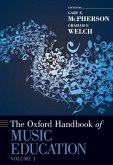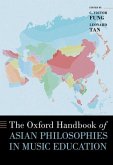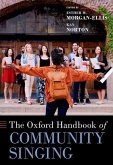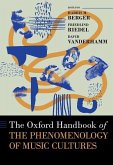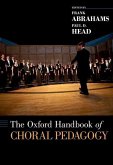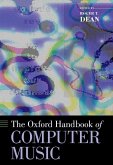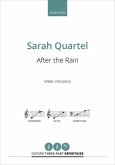The Oxford Handbook of Assessment Policy and Practice in Music Education, Volume 2
Herausgeber: Brophy, Timothy
Schade – dieser Artikel ist leider ausverkauft. Sobald wir wissen, ob und wann der Artikel wieder verfügbar ist, informieren wir Sie an dieser Stelle.
The Oxford Handbook of Assessment Policy and Practice in Music Education, Volume 2
Herausgeber: Brophy, Timothy
- Gebundenes Buch
- Merkliste
- Auf die Merkliste
- Bewerten Bewerten
- Teilen
- Produkt teilen
- Produkterinnerung
- Produkterinnerung
In this two-volume Handbook, contributors from across the globe provide expert perspectives on the assessment, measurement, and evaluation of student learning in music.
Andere Kunden interessierten sich auch für
![Oxford Handbook of Music Education, Volume 1 Oxford Handbook of Music Education, Volume 1]() Oxford Handbook of Music Education, Volume 1271,99 €
Oxford Handbook of Music Education, Volume 1271,99 €![The Oxford Handbook of Asian Philosophies in Music Education The Oxford Handbook of Asian Philosophies in Music Education]() The Oxford Handbook of Asian Philosophies in Music Education204,99 €
The Oxford Handbook of Asian Philosophies in Music Education204,99 €![The Oxford Handbook of Community Singing The Oxford Handbook of Community Singing]() The Oxford Handbook of Community Singing272,99 €
The Oxford Handbook of Community Singing272,99 €![The Oxford Handbook of the Phenomenology of Music Cultures The Oxford Handbook of the Phenomenology of Music Cultures]() The Oxford Handbook of the Phenomenology of Music Cultures204,99 €
The Oxford Handbook of the Phenomenology of Music Cultures204,99 €![The Oxford Handbook of Choral Pedagogy The Oxford Handbook of Choral Pedagogy]() The Oxford Handbook of Choral Pedagogy234,99 €
The Oxford Handbook of Choral Pedagogy234,99 €![Oxford Handbook of Computer Music Oxford Handbook of Computer Music]() Oxford Handbook of Computer Music236,99 €
Oxford Handbook of Computer Music236,99 €![After the Rain After the Rain]() After the Rain5,99 €
After the Rain5,99 €-
In this two-volume Handbook, contributors from across the globe provide expert perspectives on the assessment, measurement, and evaluation of student learning in music.
Produktdetails
- Produktdetails
- Verlag: Oxford University Press
- Seitenzahl: 992
- Erscheinungstermin: 4. Februar 2019
- Englisch
- Abmessung: 249mm x 170mm x 51mm
- Gewicht: 2018g
- ISBN-13: 9780190248130
- ISBN-10: 0190248130
- Artikelnr.: 53066014
- Herstellerkennzeichnung
- Libri GmbH
- Europaallee 1
- 36244 Bad Hersfeld
- gpsr@libri.de
- Verlag: Oxford University Press
- Seitenzahl: 992
- Erscheinungstermin: 4. Februar 2019
- Englisch
- Abmessung: 249mm x 170mm x 51mm
- Gewicht: 2018g
- ISBN-13: 9780190248130
- ISBN-10: 0190248130
- Artikelnr.: 53066014
- Herstellerkennzeichnung
- Libri GmbH
- Europaallee 1
- 36244 Bad Hersfeld
- gpsr@libri.de
Timothy S. Brophy is Director of Institutional Assessment at the University of Florida and Professor of Music Education. Dr. Brophy holds national and international leadership roles in assessment, served as a past National Chair of the Assessment Special Research Interest Group of The National Association for Music Education, and is the founding and organizing chair of the International Symposia on Assessment in Music Education (ISAME). He co-founded the first Assessment, Measurement, and Evaluation Special Interest Group for the International Society for Music Education.
* Dedication
* List of Contributors
* Part I. Music Assessment in the United States
* 1. Legislation and Common Law Impacting Assessment Practices in Music
Education
* Joshua A. Russell
* 2. The Impact of State Testing on American Music Classrooms
* Ronald G. Sherwin and Sarah H. McQuarrie
* 3. High-stakes Assessment in Music
* Glenn E. Nierman
* 4. The Status of Arts Assessment in the United States
* Marcia McCaffrey and Linda T. Lovins
* 5. Connecticut Common Music Assessments: Collaboratively Building
Capacity and Exemplars
* Richard Wells and Scott C. Shuler
* 6. The Florida Performing Fine Arts Assessment Project
* Steven N. Kelley, Beth Cummings, and Mary Grace Gordon
* 7. Kentucky Policies and Practices for Assessment in Music Education:
Past, Present, and Future
* Robyn Swanson and Philip Shepherd
* 8. Washington State's Classroom-Based Performance Assessments:
Formative and Summative Design for Music Education
* Ann René Joseph
* 9. The Texas Music Assessment: Grassroots Development of a Statewide
Music Test
* Michele Hentry
* 10. A Colorado Partnership for Assessment in Music Education
* Mark Hudson and Karol Gates
* 11. Measuring Student Learning in Michigan: The Michigan Arts
Education Assessment and Instruction Project
* Ryan Shaw and Cynthia Crump Taggart
* 12. The South Carolina Arts Assessment Program
* Ashlee Lewis, Yin Burgess, and Xumei Fan
* Part II. The Assessment of Student Music Learning
* 13. Assessment and Critical Pedagogy: A Perspective from the United
States
* Frank Abrahams
* 14. Making Assessment Meaningful, Measurable, and Manageable in the
Secondary Music Classroom
* Paul H. Kimpton and Ann Kaczkowski Kimton
* 15. Assessment Practices of American Band Directors
* Charles J. Vaughan
* 16. Assessment Practices of American Choral Music Educators
* Al D. Holcolmb
* 17. Assessment Practices of American Orchestra Directors
* Kirk Moss, Stephen Benham, and Kristen Pellegrino
* 18. Assessment Practices in American Elementary General Music
Classrooms
* Jeff Marlatt
* 19. Assessing Music in Early Childhood
* Maria Runfola
* 20. Assessment in the Music Learning Theory-Based Classroom
* Jill A. Reese and Heather N. Shouldice
* 21. Assessment in the Kodály Classroom
* Sue Leithold-Bowcock and Ann C. Kay
* 22. Assessment and Orff Schulwerk Pedagogy
* Daniel Johnson
* 23. Assessment in the Dalcroze Classroom
* Marja-Leena Juntunen and Cassandra Eisenreich
* 24. Analyzing Student Data to Inform Instruction and Increase Student
Growth
* Denese Odegaard
* 25. Assessing Music Learning through Compositions
* Clint Randles
* 26. Assessing Singing Voice Development
* Joanne Rutkowski
* 27. Self-Assessment of Singing Accuracy
* Patricia Riley
* 28. Practical Tools and Strategies for Assessing Aural Skills
* Nathan Buonviri
* 29. Assessing Music Listening
* Keith Thompson
* 30. The Assessment of Adult Music Learning in the United States
* Jeremy Lane
* 31. Culturally Responsive Assessment in Music Education
* Ebru Tuncer-Boon
* 32. Spotlight on Children and Young People with Complex Special Needs
* Helen Farrell
* 33. Evidence-based Practices for Music Instruction and Assessment for
P-12 Students with Autism Spectrum Disorder
* Robyn Swanson
* Part III. Assessment and Music Technology
* 34. Policy, Standards, and Assessment in Technology-Based Music
Instruction
* Jay Dorfman
* 35. Technical Issues Related to Computerized Music Performance
Assessment
* Daniel Massoth
* 36. Assessing Music Learning with Technology
* William Bauer
* Epilogue
* 37. Assessment in Music Education: The State of the Art
* Timothy S. Brophy
* List of Contributors
* Part I. Music Assessment in the United States
* 1. Legislation and Common Law Impacting Assessment Practices in Music
Education
* Joshua A. Russell
* 2. The Impact of State Testing on American Music Classrooms
* Ronald G. Sherwin and Sarah H. McQuarrie
* 3. High-stakes Assessment in Music
* Glenn E. Nierman
* 4. The Status of Arts Assessment in the United States
* Marcia McCaffrey and Linda T. Lovins
* 5. Connecticut Common Music Assessments: Collaboratively Building
Capacity and Exemplars
* Richard Wells and Scott C. Shuler
* 6. The Florida Performing Fine Arts Assessment Project
* Steven N. Kelley, Beth Cummings, and Mary Grace Gordon
* 7. Kentucky Policies and Practices for Assessment in Music Education:
Past, Present, and Future
* Robyn Swanson and Philip Shepherd
* 8. Washington State's Classroom-Based Performance Assessments:
Formative and Summative Design for Music Education
* Ann René Joseph
* 9. The Texas Music Assessment: Grassroots Development of a Statewide
Music Test
* Michele Hentry
* 10. A Colorado Partnership for Assessment in Music Education
* Mark Hudson and Karol Gates
* 11. Measuring Student Learning in Michigan: The Michigan Arts
Education Assessment and Instruction Project
* Ryan Shaw and Cynthia Crump Taggart
* 12. The South Carolina Arts Assessment Program
* Ashlee Lewis, Yin Burgess, and Xumei Fan
* Part II. The Assessment of Student Music Learning
* 13. Assessment and Critical Pedagogy: A Perspective from the United
States
* Frank Abrahams
* 14. Making Assessment Meaningful, Measurable, and Manageable in the
Secondary Music Classroom
* Paul H. Kimpton and Ann Kaczkowski Kimton
* 15. Assessment Practices of American Band Directors
* Charles J. Vaughan
* 16. Assessment Practices of American Choral Music Educators
* Al D. Holcolmb
* 17. Assessment Practices of American Orchestra Directors
* Kirk Moss, Stephen Benham, and Kristen Pellegrino
* 18. Assessment Practices in American Elementary General Music
Classrooms
* Jeff Marlatt
* 19. Assessing Music in Early Childhood
* Maria Runfola
* 20. Assessment in the Music Learning Theory-Based Classroom
* Jill A. Reese and Heather N. Shouldice
* 21. Assessment in the Kodály Classroom
* Sue Leithold-Bowcock and Ann C. Kay
* 22. Assessment and Orff Schulwerk Pedagogy
* Daniel Johnson
* 23. Assessment in the Dalcroze Classroom
* Marja-Leena Juntunen and Cassandra Eisenreich
* 24. Analyzing Student Data to Inform Instruction and Increase Student
Growth
* Denese Odegaard
* 25. Assessing Music Learning through Compositions
* Clint Randles
* 26. Assessing Singing Voice Development
* Joanne Rutkowski
* 27. Self-Assessment of Singing Accuracy
* Patricia Riley
* 28. Practical Tools and Strategies for Assessing Aural Skills
* Nathan Buonviri
* 29. Assessing Music Listening
* Keith Thompson
* 30. The Assessment of Adult Music Learning in the United States
* Jeremy Lane
* 31. Culturally Responsive Assessment in Music Education
* Ebru Tuncer-Boon
* 32. Spotlight on Children and Young People with Complex Special Needs
* Helen Farrell
* 33. Evidence-based Practices for Music Instruction and Assessment for
P-12 Students with Autism Spectrum Disorder
* Robyn Swanson
* Part III. Assessment and Music Technology
* 34. Policy, Standards, and Assessment in Technology-Based Music
Instruction
* Jay Dorfman
* 35. Technical Issues Related to Computerized Music Performance
Assessment
* Daniel Massoth
* 36. Assessing Music Learning with Technology
* William Bauer
* Epilogue
* 37. Assessment in Music Education: The State of the Art
* Timothy S. Brophy
* Dedication
* List of Contributors
* Part I. Music Assessment in the United States
* 1. Legislation and Common Law Impacting Assessment Practices in Music
Education
* Joshua A. Russell
* 2. The Impact of State Testing on American Music Classrooms
* Ronald G. Sherwin and Sarah H. McQuarrie
* 3. High-stakes Assessment in Music
* Glenn E. Nierman
* 4. The Status of Arts Assessment in the United States
* Marcia McCaffrey and Linda T. Lovins
* 5. Connecticut Common Music Assessments: Collaboratively Building
Capacity and Exemplars
* Richard Wells and Scott C. Shuler
* 6. The Florida Performing Fine Arts Assessment Project
* Steven N. Kelley, Beth Cummings, and Mary Grace Gordon
* 7. Kentucky Policies and Practices for Assessment in Music Education:
Past, Present, and Future
* Robyn Swanson and Philip Shepherd
* 8. Washington State's Classroom-Based Performance Assessments:
Formative and Summative Design for Music Education
* Ann René Joseph
* 9. The Texas Music Assessment: Grassroots Development of a Statewide
Music Test
* Michele Hentry
* 10. A Colorado Partnership for Assessment in Music Education
* Mark Hudson and Karol Gates
* 11. Measuring Student Learning in Michigan: The Michigan Arts
Education Assessment and Instruction Project
* Ryan Shaw and Cynthia Crump Taggart
* 12. The South Carolina Arts Assessment Program
* Ashlee Lewis, Yin Burgess, and Xumei Fan
* Part II. The Assessment of Student Music Learning
* 13. Assessment and Critical Pedagogy: A Perspective from the United
States
* Frank Abrahams
* 14. Making Assessment Meaningful, Measurable, and Manageable in the
Secondary Music Classroom
* Paul H. Kimpton and Ann Kaczkowski Kimton
* 15. Assessment Practices of American Band Directors
* Charles J. Vaughan
* 16. Assessment Practices of American Choral Music Educators
* Al D. Holcolmb
* 17. Assessment Practices of American Orchestra Directors
* Kirk Moss, Stephen Benham, and Kristen Pellegrino
* 18. Assessment Practices in American Elementary General Music
Classrooms
* Jeff Marlatt
* 19. Assessing Music in Early Childhood
* Maria Runfola
* 20. Assessment in the Music Learning Theory-Based Classroom
* Jill A. Reese and Heather N. Shouldice
* 21. Assessment in the Kodály Classroom
* Sue Leithold-Bowcock and Ann C. Kay
* 22. Assessment and Orff Schulwerk Pedagogy
* Daniel Johnson
* 23. Assessment in the Dalcroze Classroom
* Marja-Leena Juntunen and Cassandra Eisenreich
* 24. Analyzing Student Data to Inform Instruction and Increase Student
Growth
* Denese Odegaard
* 25. Assessing Music Learning through Compositions
* Clint Randles
* 26. Assessing Singing Voice Development
* Joanne Rutkowski
* 27. Self-Assessment of Singing Accuracy
* Patricia Riley
* 28. Practical Tools and Strategies for Assessing Aural Skills
* Nathan Buonviri
* 29. Assessing Music Listening
* Keith Thompson
* 30. The Assessment of Adult Music Learning in the United States
* Jeremy Lane
* 31. Culturally Responsive Assessment in Music Education
* Ebru Tuncer-Boon
* 32. Spotlight on Children and Young People with Complex Special Needs
* Helen Farrell
* 33. Evidence-based Practices for Music Instruction and Assessment for
P-12 Students with Autism Spectrum Disorder
* Robyn Swanson
* Part III. Assessment and Music Technology
* 34. Policy, Standards, and Assessment in Technology-Based Music
Instruction
* Jay Dorfman
* 35. Technical Issues Related to Computerized Music Performance
Assessment
* Daniel Massoth
* 36. Assessing Music Learning with Technology
* William Bauer
* Epilogue
* 37. Assessment in Music Education: The State of the Art
* Timothy S. Brophy
* List of Contributors
* Part I. Music Assessment in the United States
* 1. Legislation and Common Law Impacting Assessment Practices in Music
Education
* Joshua A. Russell
* 2. The Impact of State Testing on American Music Classrooms
* Ronald G. Sherwin and Sarah H. McQuarrie
* 3. High-stakes Assessment in Music
* Glenn E. Nierman
* 4. The Status of Arts Assessment in the United States
* Marcia McCaffrey and Linda T. Lovins
* 5. Connecticut Common Music Assessments: Collaboratively Building
Capacity and Exemplars
* Richard Wells and Scott C. Shuler
* 6. The Florida Performing Fine Arts Assessment Project
* Steven N. Kelley, Beth Cummings, and Mary Grace Gordon
* 7. Kentucky Policies and Practices for Assessment in Music Education:
Past, Present, and Future
* Robyn Swanson and Philip Shepherd
* 8. Washington State's Classroom-Based Performance Assessments:
Formative and Summative Design for Music Education
* Ann René Joseph
* 9. The Texas Music Assessment: Grassroots Development of a Statewide
Music Test
* Michele Hentry
* 10. A Colorado Partnership for Assessment in Music Education
* Mark Hudson and Karol Gates
* 11. Measuring Student Learning in Michigan: The Michigan Arts
Education Assessment and Instruction Project
* Ryan Shaw and Cynthia Crump Taggart
* 12. The South Carolina Arts Assessment Program
* Ashlee Lewis, Yin Burgess, and Xumei Fan
* Part II. The Assessment of Student Music Learning
* 13. Assessment and Critical Pedagogy: A Perspective from the United
States
* Frank Abrahams
* 14. Making Assessment Meaningful, Measurable, and Manageable in the
Secondary Music Classroom
* Paul H. Kimpton and Ann Kaczkowski Kimton
* 15. Assessment Practices of American Band Directors
* Charles J. Vaughan
* 16. Assessment Practices of American Choral Music Educators
* Al D. Holcolmb
* 17. Assessment Practices of American Orchestra Directors
* Kirk Moss, Stephen Benham, and Kristen Pellegrino
* 18. Assessment Practices in American Elementary General Music
Classrooms
* Jeff Marlatt
* 19. Assessing Music in Early Childhood
* Maria Runfola
* 20. Assessment in the Music Learning Theory-Based Classroom
* Jill A. Reese and Heather N. Shouldice
* 21. Assessment in the Kodály Classroom
* Sue Leithold-Bowcock and Ann C. Kay
* 22. Assessment and Orff Schulwerk Pedagogy
* Daniel Johnson
* 23. Assessment in the Dalcroze Classroom
* Marja-Leena Juntunen and Cassandra Eisenreich
* 24. Analyzing Student Data to Inform Instruction and Increase Student
Growth
* Denese Odegaard
* 25. Assessing Music Learning through Compositions
* Clint Randles
* 26. Assessing Singing Voice Development
* Joanne Rutkowski
* 27. Self-Assessment of Singing Accuracy
* Patricia Riley
* 28. Practical Tools and Strategies for Assessing Aural Skills
* Nathan Buonviri
* 29. Assessing Music Listening
* Keith Thompson
* 30. The Assessment of Adult Music Learning in the United States
* Jeremy Lane
* 31. Culturally Responsive Assessment in Music Education
* Ebru Tuncer-Boon
* 32. Spotlight on Children and Young People with Complex Special Needs
* Helen Farrell
* 33. Evidence-based Practices for Music Instruction and Assessment for
P-12 Students with Autism Spectrum Disorder
* Robyn Swanson
* Part III. Assessment and Music Technology
* 34. Policy, Standards, and Assessment in Technology-Based Music
Instruction
* Jay Dorfman
* 35. Technical Issues Related to Computerized Music Performance
Assessment
* Daniel Massoth
* 36. Assessing Music Learning with Technology
* William Bauer
* Epilogue
* 37. Assessment in Music Education: The State of the Art
* Timothy S. Brophy


